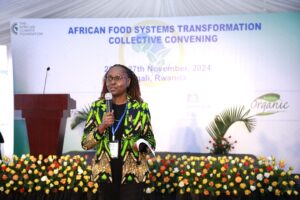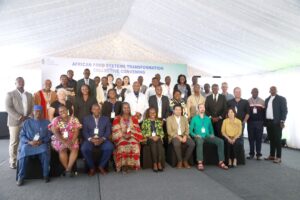
AFSTC advisor Irene Karani highlighted the network as a pilot programme managing “to leverage on thought leadership that can tell the African story in the African way. We have pulled together a critical mass of people and organisations that has the potential of being a force to reckon with”. Photo The African Climate Foundation/X.
The African Food Systems Transformation Collective (AFSTC) launched its first-ever in-person gathering on Monday, 25 November 2024, marking a critical milestone in the pan-African network’s effort to reshape the continent’s food systems.
Held in Kigali, Rwanda, the four-day convening brings together experts and stakeholders from across Africa, including the gathering’s host country, Rwanda, and South Africa, Zimbabwe, Zambia, Malawi, Uganda, Benin, Nigeria, Kenya, Ghana, Senegal, among others.
“Having collaborated online for 18 months to develop a series of issue briefs on key themes, we are convening in Kigali to share and reflect on our learnings with colleagues and philanthropic experts, to ground our reflections in real-world food systems workplaces, to network, strengthen and deepen relationships, and to strategise on AFSTC future prospects,” said Florian Kroll, member of the AFSTC secretariat, and DSI-NRF Centre of Excellence in Food Security (CoE-FS) project leader.

The AFSTC officially kicked off its first in-person convening in Kigali, Rwanda on 25 November 2024. Joining a plethora of engaged participants was Florian Kroll, CoE-FS project lead and AFSTC secretariat member, pictured in the front row, second-from-the-right. Photo The African Climate Foundation/X.
The gathering brings together AFSTC theme leaders, advisory committee members, local agroecology leaders and dignitaries, representatives of philanthropic organisations, and the AFSTC secretariat.
The African Food Systems Transformation Collective (AFSTC), an initiative of the @AfricanClimateF, is hosting its first in-person stakeholder gathering in Kigali, Rwanda, from 25 to 27 November 2024.
During her remarks, our Advisor, Irene Karani highlighted the AFSTC as a pilot… pic.twitter.com/nZqcfGl2Yn
— The African Climate Foundation (@AfricanClimateF) November 25, 2024
Promoting agroecological food systems transitions
The AFSTC was established in 2023 to inform more coherent and evidence-based funding strategies for food systems transition. It is a network of food systems researchers and practitioners who promote agroecological transitions, from across 12 African countries.
The network secretariat is a partnership between the African Climate Foundation (ACF) and the CoE-FS, hosted by the University of the Western Cape.
HAPPENING NOW!
We are hosting the African Food Systems Transformation Collective (AFSTC) in Kigali, Rwanda, from 25-27 November 2024!
This gathering is organized by @AfricanClimateF, @FoodSecurity_za, and @UNESCO_Rwanda to advance agroecological transitions.
#AFSTC2024 pic.twitter.com/c0bBqz6gvj
— Rwanda Organic Agriculture Movement (ROAM) (@RwandaRoam) November 25, 2024
The AFSTC leverages expertise from 65 researchers, a 10-member advisory committee of food systems practitioners, and a wide range of strategic partners, including the UNESCO Chair in Science and Education for African Food Systems, held by CoE-FS Director Professor Julian May; the Rwanda Organic Agriculture Movement (ROAM), the host of #AFSTC2024, and the FAO-funded South-South Triangular Co-operation, INSSPIRE.
“The AFSTC aims to cultivate a pan-African knowledge network that informs philanthropies and other stakeholders with evidence-based analysis and practical recommendations for strategies and partnership opportunities to promote agroecological food systems transitions,” said Kroll, also the convenor of the CoE-FS-hosted Food Imbizo.
A day of insightful discussions
The first day of the Kigali convening set the stage with the presentation of 18 issue briefs developed by the network’s thematic research teams. These briefs tackled key topics such as agrochemicals, aquaculture, livestock, post-harvest storage, food retail, gender equity, and land governance.
Through dynamic discussions, participants identified several high-priority recommendations for transforming African food systems including:
- Invest in agroecology and sustainable practices to enhance resilience, biodiversity, and equitable food production
- Strengthen storage and processing infrastructure to reduce post-harvest losses and ensure food safety
- Collective collaboration to mobilise private, government and philanthropic funding and advocacy
- Support grassroots networks and local actors through capacity building, flexible financing, and inclusive governance
- Integrate innovative technologies and traditional knowledge to scale sustainable solutions while preserving Africa’s food heritage
- Advocate for policy reforms and government accountability that promotes food sovereignty, equitable resource access, and climate-smart agriculture.
“As Rwanda, we stand proud as a founding member of the Alliance of Champions for Food Systems Transformation.
With @RwandaAgri soon launching its Food Systems Coordination Unit and PSAT5 strategy, we are ready to lead Africa’s agroecological transitions.
Together, we can… https://t.co/pOe9ebisDO pic.twitter.com/Ni7Oqn4HkI
— Jean Claude NIYOMUGABO (@jcniyomugabo) November 25, 2024
Shaping the future of food systems
The AFSTC is poised to continue its work into 2025, with sustained support from the ACF and CoE-FS. By fostering knowledge, building partnerships, and advocating for agroecological transitions, the collective aims to position Africa as a leader in sustainable food systems innovation.
As day two of the gathering unfolds, participants look forward to further deepening these discussions and charting a practical roadmap for food systems transformation.
related Articles
COP28’s commitment to transforming farming and food systems is an insult to Africans
COP28’s commitment to transforming farming and food systems is an insult to Africans Florian Kroll, University of the Western Cape Globally,…
African Food Systems Transformation Collective seeks sustainable solutions amid multiple crises
The African Food Systems Transformation Collective emphasised the need for agroecological transitions. Photo: Bernd 📷 Dittrich/Unsplash. During one of the…
Call for submissions: special issue of ‘Sustainability’
Photo Gabriel Jimenez/Unsplash. The special issue of Sustainability, which will build the empirical evidence base on agroecological transitions in middle-…



